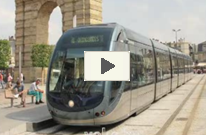A Tale of Two Cities that Work (Toronto Star)
Through robust investments in modern transit, formerly depressed cities Bordeaux and Turin have turned themselves around in record time.
By Christopher Hume
(Originally published in the Toronto Star on November 6, 2007.)
It's not problems that make cities unique, but solutions.
The issues Toronto faces, such as crumbling infrastructure and an inadequate tax, are common to communities around the world. The difference is that some cities manage to deal with them.
Especially, it seems, in Europe. The mayors of Turin and Bordeaux shared the stage at the Royal York Hotel yesterday to talk about how they have revitalized towns that as recently as 10 or 20 years ago had bottomed out.
Speaking at a conference titled The Infrastructure Challenge, both men focused on familiar questions. But it was transportation that emerged as the key to urban regeneration.
In this respect, of course, Toronto lags far, far behind. Though Mayor David Miller was on hand to praise our much-hyped Transit City plan, that's years, maybe decades, away.
In the meantime, Turin has managed to construct a new network of subways, tram routes and high-speed rail lines. Indeed, working with the Italian government, the European Union and the Region of Piedmont, Turin will have invested 6 billion euros ($8.1 billion Cdn) in public transit by 2011.
Part of the plan involves tunnelling through the Alps to connect high-speed rail lines that will eventually run from Lisbon to Kyiv.
This in a city of 1.7 million, where the workforce of the largest employer, Fiat, dropped from 120,000 in the 1980s to 18,000 today.
The intention, said Turin Mayor Sergio Chiamparino, is "to transfer mobility from the private to the public system." That means getting people out of cars and into transit.
Meanwhile, Bordeaux, a town that in its mayor's words needed "shock treatment," has built 45 kilometres of tramline in less than a decade. "In the 1990s, our transit system was 30 years out of date," Alain Jupp


